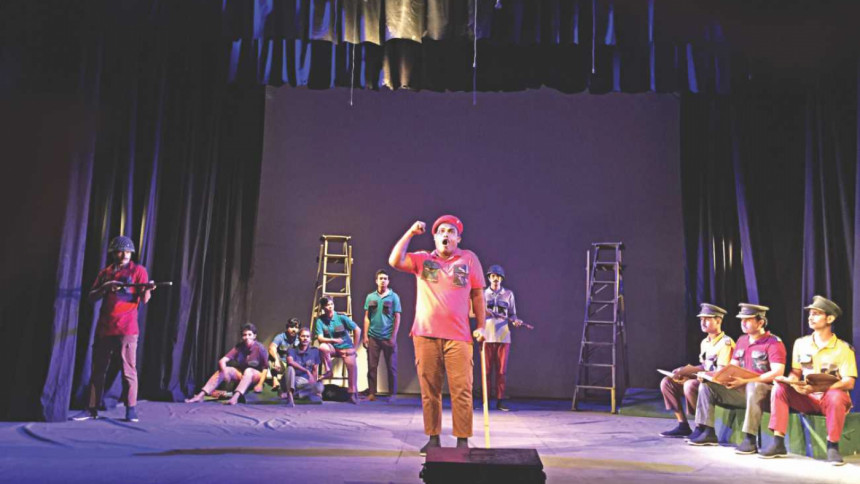Requiem for a Dream: Bot Tola's 'Crutcher Kornel'

'What you do in this world is a matter of no consequence. The question is what can you make people believe you have done.' Arthur Conan Doyle
In spite of quite a few bases for censure, there are many reasons why Bot Tola's play 'Crutcher Kornel' works extremely well with the audience. Every act of the play relentlessly dares the spectator to speak up against stagnant political orders, past and present. It dares them all to dream of change, while holding the hands of the Colonel in crutches; and all this, too, during times when a heavy hand of censor seems to be hanging over all our heads. Frantz Fanon, in his 'The Wretched of the Earth' has described most artists and professors as disorientateurs (obfuscators) who continually propagate a 'respect for the established order'. Fanon proposes that a true artist, rather than colluding with this order, can only contest it - turning theatre into a 'site for resistance'. BotTola's recent endeavor fits the bill.
And verily, theatre is a powerful tool for transformation.
Paulo Freire, the Brazilian scholar of educational philosophy, in his book 'Pedagogy of the Oppressed' (Portuguese 1968, English 1999), writes, 'Man's ontological vocation is to be a Subject who acts upon and transforms his world, and in so doing moves towards ever-new possibilities of fuller and richer life, individually and collectively'. Freire goes on to state, 'Every human being, no matter how 'ignorant' or submerged in the culture of silence he or she may be, is capable of looking critically at the world in a dialogical encounter with others.'
The writer of 'Crutcher Kornel', Shahaduzzaman, caps, just this, critical thinking while writing in 'a language that delineates a new order of imagination'. His background in medical anthropology must have given him the critical turn of mind that likes to dig deep for the truth. However, it is first Samina Luthfa and Soumya Sarker who needs to be congratulated for turning a well researched, but cut and dried, historical chronicle of the life and times of Colonel Abu Taher, into a vibrant theatrical presentation. With this pulsating script in hand Mohammad Ali Haider, then, does well to keep a fast pace of enactment, while also being able to insert humor and amusement.
Most of all, the writer and the trio of playwrights and Director are to be congratulated for addressing, though fleetingly, the process of illegitimate historical negationism or denialism, which is the distortion of the historical record.
Furthermore, taking a page out of Badal Sircar, the influential, anti-establishment, Indian dramatist's book, Ali Haider shows irreverence for the overhyped virtues of structure and form. Like Sircar, Haider disdains the importance of sets, props, costumes and lights. To an extent, he even pays scant attention to the need for learning any acting or performing techniques. The heart, though, yearns for thespians like Aly Zaker and Humayun Faridi. Whether we like it, or not like it, prowess in acting does make a difference to theatrical presentations.
What makes 'Crutcher Kornel' work most, though, is the choreography by Samina Luthfa and the background score by Pintu Ghosh. Having personally worked a lifetime with training bodies, and inscribing notions of 'perfection', watching untrained bodies move cleverly to narrate a tale, was a learning experience. A body, at the end of the day, is also the site of multiple presences – external and emotional. One soon realizes that performance occurs at the interstice of a body and a world. The action that is occurring there is a body engaging and negotiating a process of change. Here passion can very well override training.
Of Col Taher, and his brand of adventurism, I do refrain from commenting, having lived through the years that witnessed the rise and fall of progressive politics in our country. The 70s were volatile times, with a young nation and an unsettled citizenry, which had not yet recovered from an explosive war. There were too many players with too many fingers in the pie. And, never more was it true that, 'Absolute power corrupts absolutely'.
This I will say, though, there is no alternative to 'leg-work' when it comes to politics. Quick fixes do not last. The question is, are there any political persons left who are willing to sweat it through?
Dreams can be dreamt. Alas, only winners write, or re-write, history, while only requiems for the dreams of losers are staged for posterity.


 For all latest news, follow The Daily Star's Google News channel.
For all latest news, follow The Daily Star's Google News channel. 



Comments